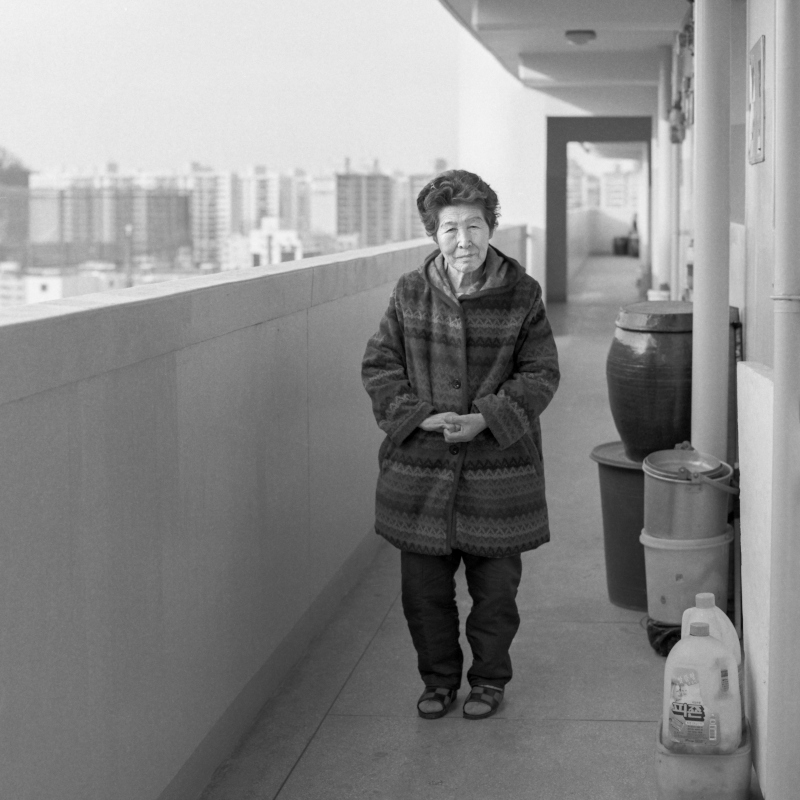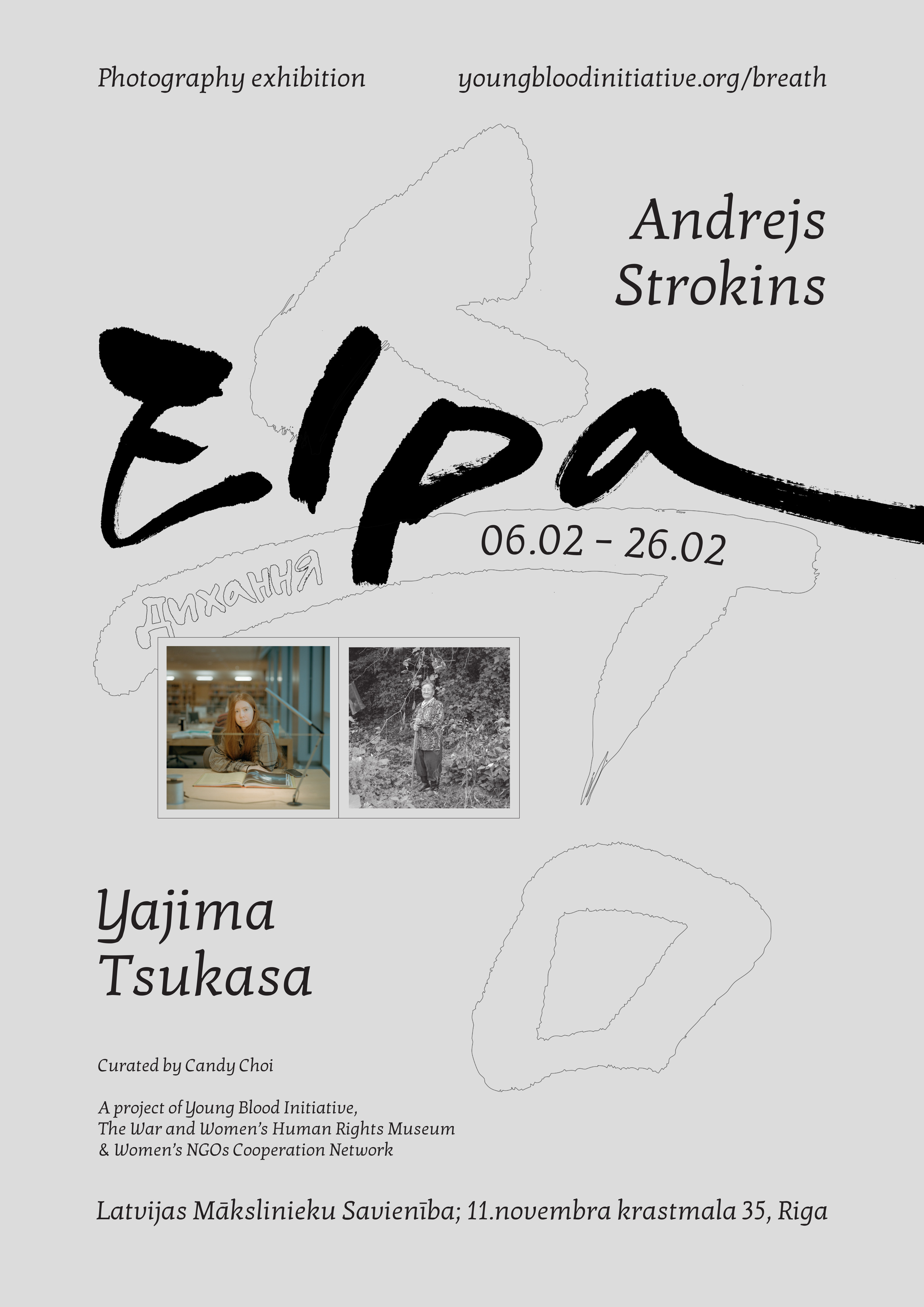A duo exhibition of Andrejs Strokins and Yajima Tsukasa, is on view in the
EU Thon Hotel in Brussels, Belgium (Rue de la Loi 75) from 6 to 8 June 2025.
Previously at LMS Gallery in Riga (11. Novembra krastmala 35, Riga) from 6 to 28 February 2025.
It is advised that visitors view the visual works and listen to the audio at the same time. Please click to reach the exhibition guide and audio recordings here
Image gallery | Press coverage
EU Thon Hotel in Brussels, Belgium (Rue de la Loi 75) from 6 to 8 June 2025.
Previously at LMS Gallery in Riga (11. Novembra krastmala 35, Riga) from 6 to 28 February 2025.
It is advised that visitors view the visual works and listen to the audio at the same time. Please click to reach the exhibition guide and audio recordings here
Image gallery | Press coverage


Titled ‘breath’ in 3 languages, the exhibition showcases the work of photographers Andrejs Strokins and Yajima Tsukasa capturing the portraits of women survivors from wars. The exhibition frames the works as a dialogue between the experiences of Korean women subjected to military sexual slavery during the Japanese invasion between 1930-1945 (also known as “comfort women”) and the current experience of Ukrainian women as they continue to resist the invasion of their country.
The word "숨(Suum)" is a Korean term that means to breathe or to give life. The title Breath. Дихання. Suum. is made up of ‘breath’ in English or Latvian, Korean and Ukrainian, it symbolises the fading breaths of the surviving comfort women and the stories of Ukrainian women who have left their country in search of a place where they can breathe freely. Where there is breath, there is hope.
“I am not free while any woman is unfree, even when her shackles are very different from my own” - Audre Lorde
Breath. Дихання. Suum. captures and reflects the trauma and pain, hopes and dreams, struggles and determination, despair and optimism of 11 women through portraits and audio recording.
Since 2022, a big number of women from Ukraine have lived through parts of the Russian invasion in their homeland and found refuge all over the world, some called Latvia their new home. Some are fresh graduates, some are mothers or professionals. There were plans and dreams of exploring the world with their loved ones, some were climbing their career ladders. They were enjoying their simple daily lives. But as bombs landed, all that vanished. Life is about survival, being alive is a blessing when the biggest conflict in Europe since World War II erupted.
Before and during World War II, on the other side of the world, the term ‘comfort women’ surfaced. These women were the victims of a military sexual slavery system established, operated and expanded by the Japanese Imperial Armed Forces from the 1930s until the end of WWII. It highlights the fact that the female bodies are often targeted and used as a weapon in armed conflicts.
The word ‘comfort’ is misleading as it disguises the darkness and inhumanity of repeated violence and rape. This issue is often a trigger of political conflicts between Japan and Korea. To date, the victims have not received an official apology, there are only a small number of surviving women left who are still fighting for justice.
Europe or Asia, early 20th century or 21st, young or old, they not only have the traumatic life experiences in common, but also in their strive for justice, freedom and peace as well as their spirit to keep fighting.
Andrejs Strokins
Andrejs Strokins (b. 1984) is a Latvian photographer, living and working in Riga. He works with documentary photography projects as well as with vernacular images and found archives. In addition to pursuing his personal projects, Strokins works as a freelance photographer, mostly working with reportage and portraiture and editorial assignments.
Yajima Tsukasa
Born in Takasaki, Japan, Yajima studied history at Waseda University and photography at the Nippon Institute of Photography in Tokyo. From 2003 to 2006, he lived in the House of Sharing in South Korea, a home for Korean women who survived the ordeal of the ‚comfort women‘ system and worked on the „Face to Face“ photography project. His photographic works have been exhibited in Germany, Japan, South Korea and Taiwan.
In the framework of a duo exhibition between Korea-based artist Yajima Tsukasa and Latvian artist Andrejs Strokins, 10 large scale photographic portraits of surviving Korean comfort women as well as Ukrainian women who experienced the ongoing war will be exhibited alongside voice recordings. The intimate body of works tells of their personal and, at times, traumatic life experiences that draw a parallel in time - early 20th and 21st century, and space - East Asia and Europe, while reflecting the same plight that affects women still 80 years on. The exhibition intends to not only show the women as victims of wars, but individuals with their own names and identities.
For this project, Strokins has created fresh portraits of Ukrainian women who currently reside in Latvia. To contrast time and space, his selection of photographs are in colour. The portraits were taken at locations in Riga where the Ukrainian women felt connected to. Being displaced just over the past couple of years, most of them felt disoriented, the idea of home became a distant concept. This, the sense of melancholy, will and hope were encapsulated in Strokins’s emotional works. To rightly express the women’s stories and emotions in the photos, private conversations with them were held to talk about their experience in Ukraine, the journey to Latvia, their hopes, dreams and trauma with the presence of a translator a couple of months before the portraits were taken.
On the other hand, the comfort women portraits by Yajima were from the Face to Face series originally exhibited in the Museum der Trostfrauen in Germany. From 2003 to 2006, he lived in the House of Sharing in South Korea, a home for Korean women who survived the ordeal of the ‘comfort women’ system, creating the portrayal series with the goal of connecting the survivors to modern societies as “Sexualised violence against women in war or conflict areas is happening even today, continuously,” said the artist. Yajima shot the photos in black and white on a Hasselblad film camera with an 80mm lens using just natural light. He modified a small storage room into a dark room in the House of Sharing where he developed films and made prints.
‘Four am on February 24, 2022.. Kharkiv. The first city in Ukraine to which the war entered. We woke up to the sound of explosions. Life was divided into before and after.’ - Natalia
‘On my fingers I count the years
Of living in a foreign land.
In the more than ten years since I left home
Only the spring of my youth’s grown old.’ - Yi Ok-seon
Accompanying the images are audio from the subjects. While the Ukrainian ones are poems, stories, experiences in spoken words, the surviving comfort women’s recordings are composed mainly of local folk songs. They are provided by Joshua D. Pilzer.
It is advised that visitors view the visual works and listen to the audio at the same time. The voice recordings and the transcriptions in English, Ukrainian and Latvian are available here in our exhibition guide here
The exhibition is curated by Candy Choi alongside consultant Inete Ielite produced by Young Blood Initiative, assisted by Krista Galandere and Jimena Mendizábal del Moral. It is made possible with the support of the Korean Council and Women’s Cooperation Network. The project title is calligraphed by Korean calligrapher Lucia Choi.
